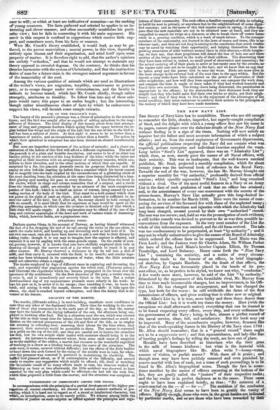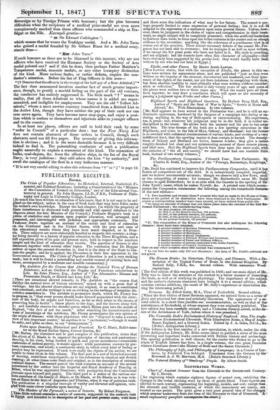THE NEW NAVY LIST.
THE history of NavyLists has its notabilities. Those who are old 'enough to remember the little, slender, imperfect, but eagerly-sought compilation of Steel, and the delight with which a young officer first saw his name in its pages, cannot glance over the elaborate details of the New Navy List without finding in it a sign of the times. Nothing will now satisfy an inquirer but the fullest and most accurate information of which a subject admits ; and as, from the usual supineness of Government departments, the official publications respecting the Navy did not contain what was required, private enterprise and individual exertion supplied the want. Long before " Steel's List " appeared, there was an " Admiralty List" ; which then, as now, merely gave the names of all Naval officers, with their seniority. This was so inadequate, that the well-known nautical' publisher, Mr. Steel, projected a monthly compilation, which for about twenty years was the universal book of reference in the Royal Navy. Towards the end of the war, however, the late Mr. Murray brought out a superior monthly list "by authority," professedly derived from official sources ; which speedily superseded "Steel's List," and long remained without a rival. One of the most useful features ma Navy or an Army List is the date of each gradation of rank that an officer has attained; and, to the astonishment of every-one- conversant with the secrets of. the prison-house, Murray's Navy List actually gave this long-desired in- formation, in its number for March 1836. Here were the means of com- paring the services of the favourediew with those of the neglected many; and the syritem of favouritism anti -injustice with which the Admiralty had long been charged, seemed proved by their own " authorized " recordi., The test was too severe; and, bold as was the promulgation of such evidence, a still bolder remedy was devised to prevent as far as was then possible in- convenience from the exposure. In.the very next number of the List the whole of this information was omitted, and the old form revived. The tale was too condemnatory to be perpetuated, at least " by authority-"; and:it may not be wholly nninstructive to give the names of the Board of Admiralty which ordered the odious facts to be suppressed. Lord Mint° was the First Lord ; and the Juniors were Sir Charles Adam, Sir William Parker the hero of China,. Lord Minto's brother Captain Elliott, Sir Thomas Troubridge, and Lord Dalmeny. Hence came forth the "New. Navy List" ; containing the seniority, and a notice of every circum- stance that tends to the honour of an officer, in brief biographi- cal sketches, by Captain Jlanitain. On the death of that officer, the New Navy. List was fortunately placed in the hands of its pre- sent editor, or, as he prefers to be styled, we know not why, "conductor." A few words more must, however, be said of the List "by authority." Stimulated by the appearance of this formidable rival, Mr. Murray from time to time made innumerable changes, but no improvement, in his Offi- cial List. He has changed the arrangement, and he has changed the type, but both for the worse : he still withholds the dates of the first commissions of-officers, and gives nothing that is either new or original. Mr. Allen's -List is, it is true, more bulky and three times dearer than the Official List: but it is worth ten times the money. Here (with the exceptions we shall afterwards notice) everything that can be wanted is to be found respecting every officer, every-ship, and every ordinance for the government of the Navy; being, in fact, almost a perfect record of the naval service, clear, full, and satisfactory. But the book may yet be improved. Many of the amendments require, however, firmness like that of the truth-speaking James in his History of the Navy since 1793: Mr. Allen should remember, that in a "general record" there ought not to be a suppressio veri ; and that squeamishness, and lady-like fear of hurting people's feelings by telling the truth, are here out of place. Heralds have been described as historians who dip their pens , in the milk of human kindness : but whit is the material with., which naval biographers like Mr. Allen write ?—honey-water, essence of violets, or parfait amour ? With them all is praise ; and though men may have been publicly censured and even punished by courts-martial with loss of rank, not a trace of such proceedings is to be found in Mr. Allen's biographical notes. Though the fact is some- times manifest by- the names of officers occurring at the bottom of the list, they are gently called the "juniors" of their respective ranks; and* the lay reader is in perfect darkness as to the cause. These cases ought to have been explained briefly, as thus : By sentence of a court-martial on the — of — for —." The ambition of the conductor of the New Navy List seems to have been to gratify the vanity of officers. Rightly enough, those who were in the great battles are indicated by particular marks, and so are those who have been rewarded by their Sovereign or by Foreign Princes with honours; but the plan becomes ridiculous when the recipients of a medical prize-medal are even more conspicuously marked than those officers who commanded a ship at Tra- falgar or the Nile. Exempli gratia- " in Sir Edward Codrington "; which means that he wears the Trafalgar medal. And a Mr. John Tarn, who gained a medal founded by Sir Gilbert Blane for a medical essay, stands thus— "bin John Tarn."
If such honours as these are to be blazoned in this manner, why are not officers who have received the Humane Society or the Society of Arts medal pointed out ? and if this be done, then perhaps Father Matthew's Temperance medal, masonic medals, or any other trumpery distinction of the kind. More serious faults, or rather defects, require the con- ductor's attention. Before his list of Flag Officers is this note— '(j Denotes that the officer is in the receipt of the half-pay of a Rear-Admiral.)" • The that thus announced involves another fact of much greater import- ance, though, to gratify a morbid feeling on the part of the old veterans, the conductor has entirely suppressed it. The little mark "t" means in reality, that all those Admirals to whose names it is added are super- arumatecl, and ineligible for employment. They are the old "Yellow Ad- mirals," whom a most unwise courtesy transferred from a Retired List to the Active List, though they have neither the pay of their rank nor *an ever serve again. They have become mere stop-gaps, and enjoy a posi- tion which is useless to themselves and injurious alike to younger officers and to the country.
In at least ten places, officers are said to hold their rank by some "'order in Council" of a particular date : but the New Navy List does not contain abstracts of those orders in Council, though such abstracts need not fill five pages. The necessity of giving this informa- tion is obvious ; and it is the more desirable because it is very difficult indeed to find it. The painstaking conductor of such a publication ought assuredly to explain a statement of this kind. The separation of hulks, coal-depots, &c. from the effective ships, in the list of the Royal Navy, is very judicious : they still adorn the List "by authority," and swell the catalogue of the fleet in a very ludicrous manner.
*It is not very careful editing to alter this reference from" " to ": " in page 12.



























 Previous page
Previous page